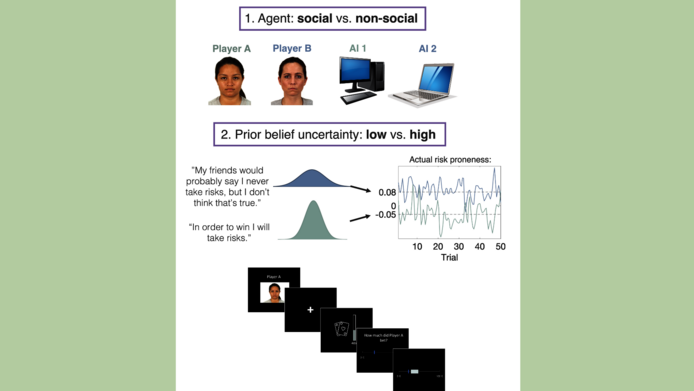How dopamine influences trust

Imagine you are meeting a friend who has been punctual for ten out of ten previous meetings. When meeting her for the eleventh time, you probably expect her to arrive at the agreed time. The manner in which we form such expectations – and with what degree of certainty – is at the core of the research of Bianca Schuster, a psychologist at the University of Vienna.
In the FWF-funded research project “Dopamine and precision weighting of social signals” she investigates how we assess other people's behavior and learn about them. According to Schuster, the answer could be a statistical process: we weigh our experience and new information against each other based on their probabilities. Schuster surmises that the neurotransmitter dopamine plays a central role in this process. If someone’s dopamine system is disrupted, as is the case in afflictions such as depression or schizophrenia, then that person is more challenged to interpret social situations correctly.
About the project
Does dopamine level influence how well people can evaluate information and adapt their social behavior accordingly? A clinical study is investigating what is currently still speculation: whether dopamine blockages negatively influence people's social skills.
A question of weighing up
“If we meet someone at a funeral, we probably assume that they are sad,” is another example provided by Schuster. “If the person then smiles unexpectedly, we still assume that there is an underlying sad emotion. Perhaps the person's facial expression does not reflect the genuine emotion. Or we are misled by what we see, for example because we don't have our glasses on.”
Social situations are typically replete with such uncertainties. The degree to which we trust certain information depends on how certain we are of it, and it is based on experience. Psychologists refer to this as “precision weighting.” “Bayesian inference theory says that we learn statistically from sampling and experience,” explains Schuster. We assess our environment by calculating probability distributions. “In the example I quoted, we rely more on our prior knowledge that people are usually sad at funerals and attribute less importance to sensory information such as a smiling face.”
“The theory is very mathematical,” Schuster admits. Hitherto, Bayesian inference has mostly been applied to non-social contexts. Schuster is transferring the concept to social interactions – with particular focus on the neurotransmitter dopamine, because dopamine is suspected of influencing our assessment of probabilities.
Using the example of a poker game
“In the first phase of the research project I focused intensely on developing new cognitive tasks with which we can test this theory,” says Schuster. One of the tasks is based on a poker game: the test subjects receive preliminary information about eight players – things like how much risk appetite they themselves think they have. Four of the players are humans and four are artificial intelligences.
The test subjects are then shown a hand of cards and the mathematical probability of winning with that hand. The task is now to estimate how much money player A has bet based on the preliminary information, the probability of winning, and the player's previous behavior.
“We expect our test subjects to assess the actual risk appetite of the individual players based on the preliminary information given and by observing the moves they make,” explains Schuster. “Depending on how clear the preliminary information is, the task reflects different situations – involving people we hardly know on the one hand and those whose behavior we can well evaluate on the other.”
What role does dopamine play?
In the next step, Schuster wants to change the dopamine levels of the test subjects through medication and observe whether their assessments change. “Our medication study is currently underway. It will take around six months, and then we will begin the analysis,” reports Schuster. It is her hypothesis that dopamine levels influence how sure the information appears to the test subjects and whether they trust it. “The evidence is very inconclusive, but there are a few studies that suggest that blocking dopamine can reduce a person’s ability to assess the certainty of different pieces of information and then weigh them against each other.”
Often referred to as the “happiness hormone”, dopamine performs many different functions in the body. “In the case of Parkinson's disease we know that movement disorders are caused by the death of dopamine-producing cells,” says Schuster. Dopamine also plays a central role in the reward system and motivation. This has been demonstrated in behavioral studies in which mice learn that when a tone is emitted it is followed by a sugar solution. Over time, the animals' dopamine neurons start firing as soon as they hear the sound. “What interests me is a newer theory that dopamine communicates not so much the value of a reward, but rather the probability that we can expect to receive the reward in the first place,” says Schuster.
What calculations reveal about us
An important component of the project is the method of evaluation. “In addition to conventional statistical methods, we also analyze our data using computational modelling,” notes Schuster. Such methods not only allow one to calculate averages, but also to capture dynamic changes in behavior. “What makes this method special is that we can identify subtle differences over time and between individuals that might be overlooked by conventional analyses. We hope this will reveal latent processes—such as how people weigh different uncertainties in social situations.” According to Schuster, such a model could also be used in the long term to track and predict individual disease progression or responses to medication.
A common denominator?
With her research project, the psychologist wants to decipher fundamental patterns that unite diseases such as Parkinson's, depression, and schizophrenia, as well as neurological developmental variants such as autism. “I'm interested in why there are so many forms –some of them medical – that cause people to struggle with social situations. Even though the conditions are very different, there are some overlaps,” she says, and adds: “That's the issue I'm really passionate about. The freedom that the FWF-ESPRIT grant gives me is a great privilege, and it allows me to pursue an idea that no one else is investigating.”
“It is important to emphasize that these processes are extremely fast and unconscious and are strongly influenced by individual experience. And while it is true that we perceive and assess our environment using statistical regularities, there are many influences that cause us to behave 'irrationally' in the eyes of the outside world,” adds Schuster. This is precisely the reason why people are sometimes so difficult to predict and what makes social situations so special.
About the researcher
Bianca Schuster conducts research at the Department of Psychology of Cognition, Emotion, and Methods at the Faculty of Psychology at the University of Vienna. She previously studied and worked at the University of Birmingham in the UK and at Waseda University in Japan. The project “Dopamine and precision weighting of social signals” receives roughly EUR 300,000 in funding from the Austrian Science Fund (FWF). It is part of the ESPRIT funding stream, which supports researchers at the outset of their scientific careers in carrying out independent research projects.
Publications
How dopamine shapes trust beliefs, in: Progress in Neuropsychopharmacology & Biological Psychiatry 2025
Disruption of dopamine D2/D3 system function impairs the human ability to understand the mental states of other people, in: PLOS Biology 2024






